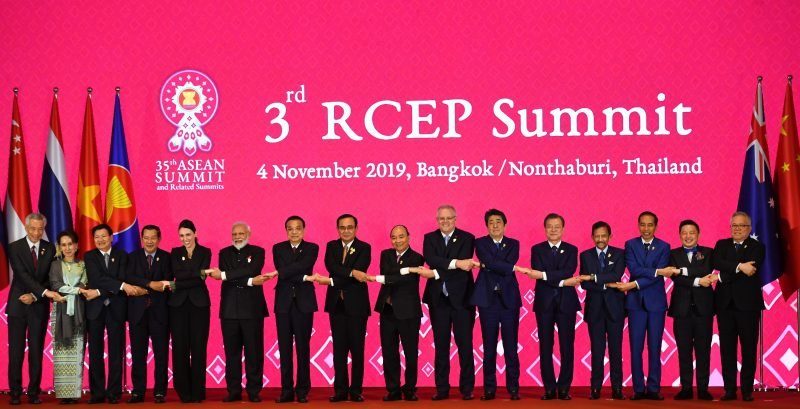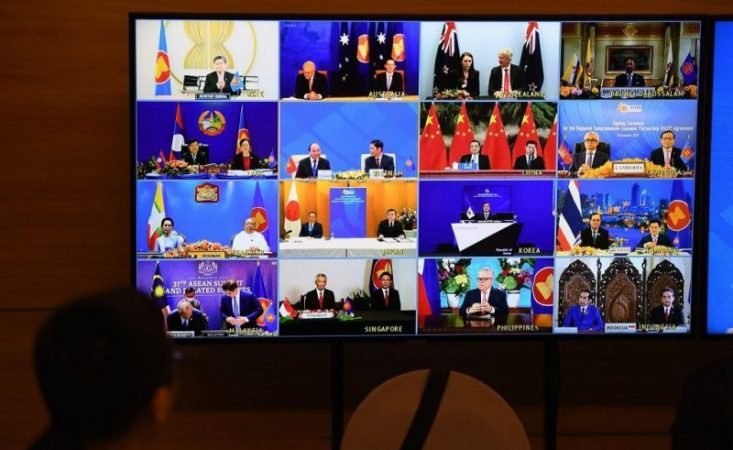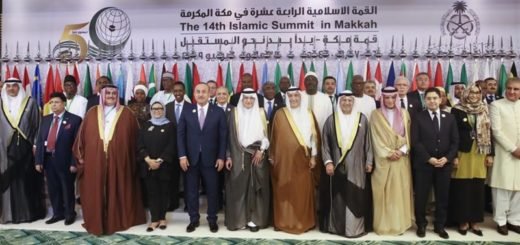Will RCEP Change the Game in Asia?

EXECUTIVE SUMMARY: In a move that could represent another step in Washington’s decline and China’s hegemonic ascent in Asia, 15 state ministers signed the RCEP free trade agreement on November 15, 2020. The question weighing on policymakers across Asia, Europe, and the US is whether the RCEP economic bloc will change the global economic balance of power.
Negotiations for the RCEP (Regional Comprehensive Economic Partnership)free trade agreement began in 2012. On November 15, 2020, 15 states signed the agreement. Ten of those states—Brunei, Cambodia, Indonesia, Laos, Malaysia, Myanmar, Philippines, Singapore, Thailand, and Vietnam—are members of the Association of Southeast Asian Nations (ASEAN). China, South Korea, and Japan became the ASEAN Plus Three in 1997, to which were later added Australia, New Zealand, and India (creating the ASEAN Plus Six).
With the exception of India, all the countries in the ASEAN Plus Six also signed the RCEP, bringing the total to 15. One important country was missing, however: the US.
Some RCEP members are members of regional and global organizations that do include the US—for example, APEC (the Asia-Pacific Economic Cooperation) and ARF (the ASEAN Regional Forum). The Obama administration initiated the Trans-Pacific Partnership (TPP), which included Asian states as well as North and South American countries but did not include China.

President Donald Trump decided to withdraw from the TPP soon after his election. If the Asian countries thought Washington was going to balance China with the TPP, they soon learned that Trump had different ideas about instruments of regional cooperation, which, in his view, threaten Washington’s bilateral leverage.
The RCEP sends a clear message that Beijing is the most important economic player in the region. China is a key trading partner of all the group’s members.
The RCEP represents a new trading bloc that will be able to balance the EU and NAFTA. The ASEAN countries of Japan, South Korea, New Zealand, and Australia are now wondering whether the RCEP will increase Beijing’s leverage over them or will lead China to be more aggressive in asserting its global power. The economic sanctions China imposed on South Korea during the THAAD crisis as well as the new tariffs Beijing placed on an Australian winery send out a warning to its neighbors that China is willing to use its economic power (as is Washington).
The trade war between China and the US during the Trump administration forced some RCEP members to take a stand and support either Washington or Beijing. Most of them preferred to stand on the sidelines in the hope of minimizing whatever economic fallout might result from the clash.
The RCEP challenges Washington’s economic position in the region. The incoming Biden administration will find it harder to gain the support of the Asian members of RCEP to support sanctions or other forms of pressure on China. The US administration will have to convince its Asian allies that the alliance between the US and Japan, South Korea, Australia, and other regional states is solid and that Washington’s commitment to the region remains unchanged.

In order to improve relations with Asia, Washington should put effort into resolving the ongoing tension between Seoul and Tokyo. The Trump administration decided not to intervene and left the states to solve their issues themselves. Washington will also need to take a stand on the rising tensions between Australia and China.
The new US administration will have to tilt toward Asia if it is to continue to be an important player in the region. As of right now, China is bolstering its Asian regional hegemony without US interference.
This article was originally published by BESA Center


















